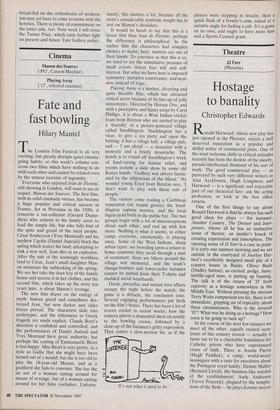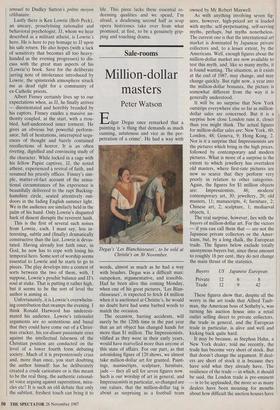Theatre
JJ Farr (Phoenix)
Hostage to banality
Christopher Edwards
Ronald Harwood, whose new play has just opened at the Phoenix, enjoys a well deserved reputation as a popular and skilful writer of commercial plays. One of the most welcome shifts in critical attitudes recently has been the decline of the snooty, pseudo-intellectual dismissal of his sort of work. The good commercial play — as purveyed by such very different writers as Alan Ayckbourn, Hugh Longmore and Harwood — is a significant and enjoyable part of our theatrical fare: ask the acting profession, or look at the box office returns.
One of the first things to say about Ronald Harwood is that he always has such good ideas for plays — for instance, Another Country, The Dresser and Inter- preters. Above all he has an instinctive sense of theatre, an insider's knack of creating expectation and atmosphere. The opening scene of JJ Farr is a case in point. It is early one summer morning and we are outside in the courtyard of Jocelyn Her- bert's excellently designed small pile of a country house in Bucks. Oliver Bude (Dudley.Sutton), an excited, podgy, fussy, middle-aged man, is putting up bunting. The talk is of the return of IP from captivity as a hostage somewhere in the Middle East. Without pressing the obvious Terry Waite comparison too far, there is an immediate, gripping air of topicality about these circumstances. Who is the revered 'Jr? What was he doing as a hostage? How soon is he going to turn up? In the course of the next few minutes we meet all the other, equally excited occu- pants of this country retreat — actually it turns out to be a charitable foundation for Catholic priests who have experienced crises of faith. There is Austin Purvis (Hugh Paddick), a camp, world-weary monsignor with a taste for anecdotes about the Portugese royal family; Dennis Mulley (Bernard Lloyd), the business-like warden of the establishment; Andy Anderson (Trevor Peacock), plagued by the tempta- tions of the flesh — he plays homme moyen sen,suel to Dudley Sutton's pretre moyen celibataire.
Lastly there is Ken Lowrie (Bob Peck), an uneasy, proselytising rationalist and behavioral psychologist. JJ, whom we hear described as a militant atheist, is Lowrie's hero. He is here to pay homage to JJ upon his safe return. He also hopes (with a lack of sensitivity that becomes all too heavy- handed as the evening progresses) to dis- cuss with the great man aspects of his (Lowrie's) book. Save for the deliberate jarring note of intolerance introduced by Lowrie, the spinsterish atmosphere struck me as dead right for a community of ex-Catholic priests.
Albert Finney certainly lives up to our expectations when, as JJ, he finally arrives — disorientated and horribly branded by his captors. Finney exudes a massive au- thority coupled, at the start, with a trou- bled, half-understood inner torment. He gives an obvious but powerful perform- ance, full of hesitations, interrupted sequ- ences of thought and barely contained recollections of horror. It is an often riveting, dignified and convincing study of the character. While locked in a cage with his fellow Papist captives, JJ, the noted atheist, experienced a revival of faith, and resumed his priestly offices. Finney's sim- ple, matter-of-fact account of the sensa- tional circumstances of his experience is beautifully delivered to the rapt Bucking- hamshire circle, seated attentively out- doors in the fading English summer light. We in the audience are similarly held in the palm of his hand. Only Lowrie's disgusted bark of dissent disrupts the reverent hush.
This is the first of several such noises from Lowrie, each, I must say, less in- teresting, subtle and (finally) dramatically constructive than the last. Lowrie is devas- tated. Having already lost faith once, in God, he now has to cope with losing his temporal hero. Some sort of worship seems essential to Lowrie and he starts to go to pieces. The play develops into a contest of sorts between the two of them, with, I suppose, Lowrie's pyschic balance and JJ's soul at stake. That is putting it rather high, but it seems to be the sort of level the author is aiming at.
Unfortunately, it is Lowrie's overwhelm- ing contribution that swamps the evening. I think Ronald Harwood has underesti- mated his audience. Lowrie's rationalist arguments are so sententious and banal that they could have come out of a Christ- mas cracker, his soi-disant passionate cries against the intellectual falseness of the Christian position are conducted on the level of a lower fourth form debating society. Much of it is preposterously crass and, more than once, you start doubting the author himself: has he deliberately created a crude caricature or is this meant to be the real thing, the authentic rational- ist voice arguing against superstition, mira- cles etc? It is such an old debate that only the subtlest, freshest touch can bring it to life. This piece lacks these essential re- deeming qualities and we spend, I'm afraid, a deadening second half as soap opera histrionics take over from what promised, at first, to be a genuinely grip- ping and touching drama.



































































 Previous page
Previous page